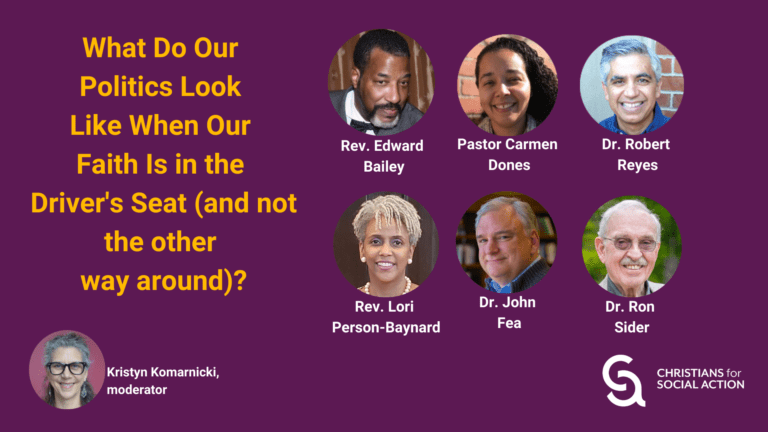Questions for Christians
- Why should my faith have anything to do with my politics?
- What would it look like to let Christ be Lord of my politics?
- How should biblical teaching inform my politics?
Overview
Although most people never think about it concretely, every person has some baseline principles that guide their political judgments. Everyone has some sense, however implicit, of right and wrong, of how people should be treated or what mercy and justice look like, for example.
While both our family upbringing and the culture we live in exert an enormous influence on each of us, God invites us to root ourselves in and wrestle with the scriptures as our starting place. What is justice? What is peace? What is the value of human life? What is our responsibility for creation?
But we need more than just a normative framework. We also need to study the world–the relevant economic systems, what the scientific community knows, the historical context, etc. Then, we need to combine these two—our understanding of the biblical framework and our study of the world—to develop a political philosophy—one that will, if healthy, be constantly evolving as we continue to study both the Bible and the world around us. Finally, we need to apply that political philosophy to concrete political decisions. (See Ronald J. Sider’s Just Politics for a longer statement about these four parts of careful Christian political thinking.)
of representatives in the current Congress identify as Christian. Protestants and Catholics are still overrepresented on Capitol Hill relative to their share of the U.S. population. (Pew Research)
of actively religious adults in the United States say they always vote in national elections, compared to 59% of religiously inactive or 48% of religiously unaffiliated adults. (Pew Research)
voters with lower family incomes (58%) associate with the Democratic Party, compared with 36% who affiliate with the Republican Party. (Pew Research)

Why it matters
The National Association of Evangelicals is the largest evangelical network in the United States. Ron Sider co-chaired the process that produced their official public policy document, For the Health of the Nation. That document says: “Faithful evangelical civic engagement and witness must champion a biblically balanced agenda.“ Then the document proceeds to develop eight important areas: religious freedom, the sanctity of human life, marriage, seeking justice and compassion for the poor, human rights, racial justice, peace, caring for God’s creation.
All these areas are essential, and they all have real-world, often life-or-death implications for individuals, families, and whole communities. How we vote can make the difference between
- educating a child or leaving her behind;
- holding corporate polluters accountable or making those they pollute pay the price with their lives and livelihoods;
- providing fair sentences or furthering the racial inequality that plagues our criminal justice system.

What you can do
Personal action:
Resolve to let biblical teaching provide your normative framework and then decide to study what the Bible has to say on one or two important current issues. The book Discerning Ethics: Diverse Christian Responses to Divisive Moral Issues, edited by Hak Joon Lee and Tim Dearborn, is a great place to start, as it outlines how people of faith land in different places on a wide variety of important issues—including climate change, poverty, immigration, access to health care, abortion, war, gun violence, and public education—while sharing the scriptural bases for each position.
Societal action:
Choose one major current societal issue and resolve to get more involved on that issue. In the short run, do some serious study. In the long run, join an organization that lobbies politicians and seeks to move society to a more just position.
When the righteous increase, the people rejoice, but when the wicked rule, the people groan.
Proverbs 29:2

When Patriotism Becomes Idolatry
By Stephen Mattson
More often than not, what Christians think of as ‘patriotism’ is what God defines as ‘idolatry.’
Jesus once said, “render to Caesar the things that are Caesar’s

What Do Our Politics Look Like When Our Faith Is in the Driver’s Seat…?
With Rev. Edward Bailey, Rev. Lori Person-Baynard, Dr. Robert Reyes, Pastor Carmen Dones, Dr. Ron Sider, and Kristyn Komarnicki

Why Single-Issue Voting Doesn’t Reflect the Gospel
By Nikki Toyama-Szeto
Single-issue voting works for political operatives trying to grab the Christian vote, but it is an unfaithful representation of the fullness of the heart of God. It reflects political pragmatism but not Christian faithfulness.
Additional Resources
Books by Ron Sider:
- Just Politics: A Guide for Christian Engagement
- Rich Christians in an Age of Hunger
- The Spiritual Danger of Donald Trump: 30 Evangelical Christians on Justice, Truth and Moral Integrity (ed., Ron Sider)
Bread for the World is an excellent and highly effective Christian organization that lobbies to end poverty both in the US and abroad.
The Center for Public Justice is an independent, nonpartisan organization devoted to policy research and civic education. Working outside the familiar categories of right and left, conservative and liberal, they seek to help citizens and public officeholders respond to God’s call to do justice.
Christians in Politics is a UK-based group that helps provide a biblical framework for thinking about politics. Their goal is to see Christians respond to God’s call to positive, relational political engagement.
Ron Sider’s blog addressed politics through a theological lens. For Ron Sider’s comments on politics, go to ronsiderblog.substack.com to join.
Watch our 2020 panel discussion, centering voices of color: What Do Our Politics Look Like When Our Faith Is in the Driver’s Seat…?
